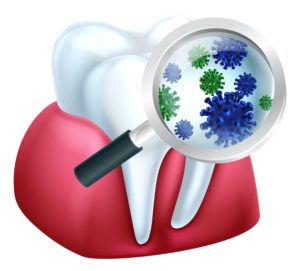Gum disease refers to an infection in the gum tissue that affects more than half of adults in the United States. You will need intervention from a dentist to get rid of this infection. And if you do not seek prompt treatment, gum disease will cause major and irreversible damage to your teeth, gums, and jaw.
Healthy at-home dental care can help you keep the bacteria that cause this oral infection at bay. But some predispositions can lead to a greater chance of this disease than other dental patients. Read on to learn about three factors that could put you at a higher risk of contracting gum disease.

What Issues Can Heighten My Risk of Gum Disease?
Aggressive Oral Bacteria
The mouth naturally contains bacteria. You keep them from spreading and infecting your gums by removing plaque through good oral hygiene habits. But some people form an aggressive type of oral bacteria that oral hygiene alone cannot keep at bay. The cause of this development is unclear.
If this occurs, you and your dentist can work on more targeted preventative dental care that can protect your gums from infection. This might include adding antibacterial mouthwash to your daily oral hygiene routine. This product can help to balance the bacteria in your mouth to prevent its spread.
Underlying Health Conditions
Certain medical conditions can make you more prone to contracting gum disease than other dental patients. Chronic illnesses like heart disease, diabetes, and arthritis can create inflammation throughout the body.
This, in turn, will make you more likely to suffer inflammation in the gums and contract infections. The opposite is also true: inflammation in the gums from gum disease will make your body less able to fight inflammation in other areas, worsening symptoms from chronic conditions.
Situations like pregnancy and hormone fluctuations will also increase a patient’s risk of gum disease. Talk to your dentist about your medical history, as this can play a role in your periodontal and dental health.
Poor Oral Habits
Your oral habits will also impact the health of your gums, so pay attention to your behaviors and your smile. For example, smoking is known to be bad for you, but it can definitely hurt your gums. Tobacco usage will decrease saliva production among other effects, which can leave you with dry mouth that can increase your risk for oral infections.
Your diet will also affect your gum health. So make sure you eat foods with plenty of nutrients, including vitamin C. This will help your body fight inflammation and infections.
Even if you complete oral hygiene as often as you should, it will not keep your gums safe if you do not brush and floss properly. Confirm you use the proper tools and techniques to clean your smile if you want to prevent gum disease and other dental problems. Visit your dentist for routine exams and cleanings too for optimal preventative oral health care.
